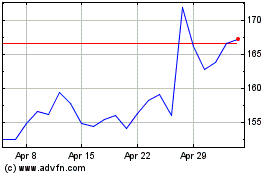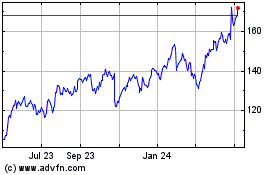By Patience Haggin
For Gap Inc., January 2020 will bring a lot more than just
after-Christmas sales.
Starting next year, all California residents will have the right
to ask retailers, restaurants, airlines, banks and many other
companies to provide them with any personal information they may
have, including individual contact information, purchases and
loyalty-program history. Consumers also can ask that businesses
delete their information, or opt out of letting it be sold.
"You have to find a way to capture all that information and
track it so you know what's happening with that information," said
Dan Koslofsky, associate general counsel for privacy and data
security at Gap. "And that's a pretty significant undertaking for
most companies. Unless you've been in a regulated space like health
care or financial services, you probably haven't done that
previously."
The California Consumer Privacy Act was designed to make
data-trafficking companies and tech giants such as Amazon.com Inc.,
Alphabet Inc.'s Google and Facebook Inc. more transparent about how
they handle user data.
But the law, which passed last year and goes into effect Jan. 1,
applies to any for-profit business that does business in California
and collects data on California residents, as long as its annual
revenue tops $25 million, or it holds personal information on at
least 50,000 consumers, or it generates at least 50% of its annual
revenue from selling user data. Even companies with no physical
presence in California but a website that serves Californians are
preparing to comply.
Some 500,000 U.S. businesses across all sorts of industries meet
that criteria, according to the International Association of
Privacy Professionals. They include companies as varied as
Starbucks Corp. and Gap, health insurer Aetna Inc.,
financial-services firm Wells Fargo & Co., American Airlines
Group Inc. and toy maker Mattel Inc. -- as well as hundreds of
thousands of small and medium-size businesses.
Few companies keep all their customer data in one place, and now
many are scrambling to build tools to match up individuals' data
across disparate systems, such as directories, purchase histories
and customer-service request logs. Companies also have to review
their data-sharing arrangements with vendors and disclose them in
their terms of service.
Gap had a certain head start because it already brought its
European business into compliance with the European Union's General
Data Protection Regulation, which took effect last year and has
similar customer-data requirements. To prepare for these laws,
Gap's privacy team interviewed about 200 employees across the
company about how they use data.
Many other companies, though, are much further behind. The
California law was passed last summer, but many companies delayed
preparations during the lengthy amendment process. In a survey
PricewaterhouseCoopers conducted last year, only 52% of respondents
said they expected their company to be CCPA-compliant by January
2020.
"I'm concerned about people falsely accusing us of having
information on them when indeed we don't," said Jeff Savage,
president of the River Cats, Sacramento's minor league baseball
team, which has more than 100,000 people in its email database.
"How do I prove to Joe Smith that I don't have his info?"
Once the law becomes enforceable, which is expected by next
summer, businesses that get a customer data request will have to
comply within 45 days or risk pricey fines and possible civil
litigation. The law threatens steep damages in the event of a data
breach -- as high as $7,500 per affected person. Businesses also
have to add a "do not sell my personal information" option to their
home page where consumers can opt out.
Given the difficulty of maintaining a separate protocol for
California's 39.6 million residents, many businesses are choosing
to apply the changes they make for California to the rest of the
country. Some anticipate that the California law will become a kind
of de facto national standard, much like the state's standards for
auto emissions.
Rena Mears, a principal with the law firm DLA Piper, said, "99%
of the businesses that we're dealing with are choosing to make the
law apply to all their U.S. customers."
The requirements' complexity has created an opportunity for some
tech firms. Microsoft Corp. is preparing compliance software, as is
LiveRamp Holdings Inc., as well as startups like SECURITI Inc.,
Text IQ Inc. and BigID Inc.
Gap said it doesn't sell data to brokers but does share customer
mailing addresses with catalog companies. The retailer's privacy
team has been scrutinizing those contracts and its disclosures to
customers to make sure they comply with the California law.
One uncertainty is whether retail loyalty programs -- which
reward consumers who let a company keep and sometimes sell their
data -- could be considered a form of discrimination against
shoppers who exercise their data rights. Another question is
whether a customer who used a credit card in a store but never
provided further data would be owed a personal data file. Mr.
Koslofsky said Gap wouldn't store enough data on such a user to be
able to identify them and would explain that in response to such a
request.
Companies are gearing up for every conceivable scenario,
including the possibility that identity thieves may pose as someone
else to obtain their data.
If consumers in large numbers opt out of data sales, the
greatest impact may be on data vendors and digital-advertising
companies.
Los Angeles-based Factual Inc. provides location-tracking
software for mobile apps, and then sells the users' location data
to advertisers. If a user allows the app to use his or her location
but opts out of having the data sold, Factual would still be
obligated to provide the service but wouldn't be able to include
that individual's data in the segments it sells to ad buyers,
Factual's Chief Marketing Officer Brian Czarny said.
The California state legislature passed the hastily written law
in a deal to block a more ambitious ballot initiative. That left
the door open for both industry and privacy groups to spend the
past year wrangling over amendments to the law, rather than
preparing for it.
The bills for software and attorneys can creep up.
"Any Fortune 500 company is going to spend at least $1 million
on CCPA compliance" in the law's first year, said Jay Cline, a
principal with PricewaterhouseCoopers. "And we've seen budgets as
high as $100 million."
Write to Patience Haggin at patience.haggin@wsj.com
(END) Dow Jones Newswires
September 08, 2019 09:14 ET (13:14 GMT)
Copyright (c) 2019 Dow Jones & Company, Inc.
Alphabet (NASDAQ:GOOGL)
Historical Stock Chart
From Mar 2024 to Apr 2024

Alphabet (NASDAQ:GOOGL)
Historical Stock Chart
From Apr 2023 to Apr 2024
